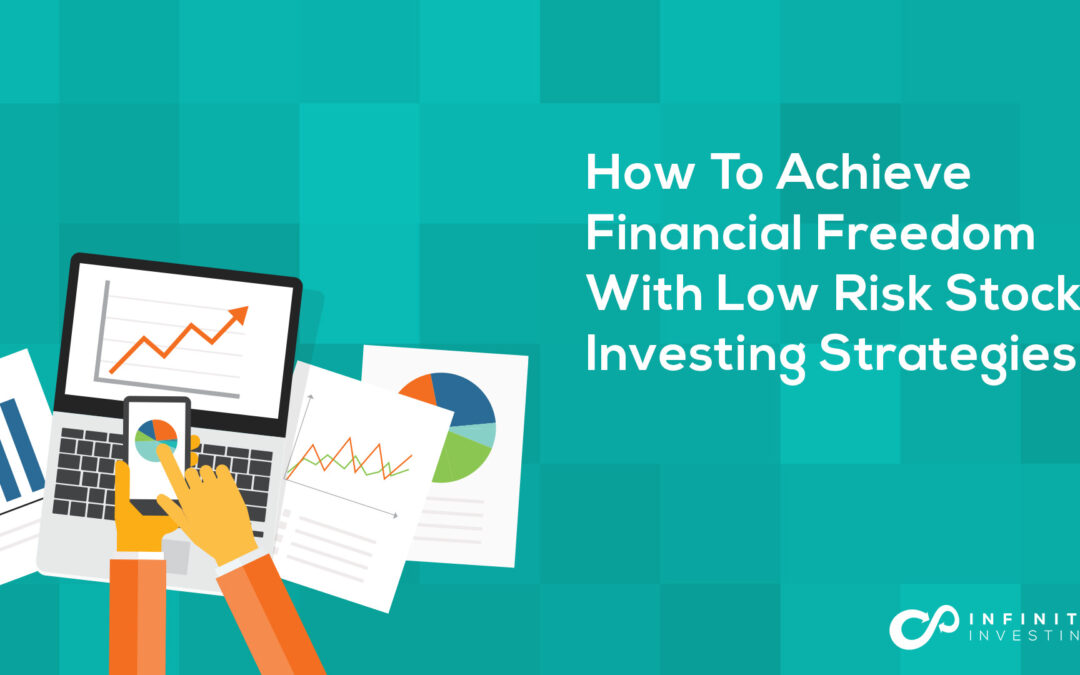
If you strive for financial freedom, it makes sense that you would look for investment strategies that come with few risks. In fact, low-risk stock investing strategies could be the key to helping you achieve financial freedom. Are you looking to increase the number in your savings account? Do you want to have more cash on hand? These are some low-risk strategies you can use to see real results.
Key Takeaways:
- Low-risk stock investing strategies are helpful for preventing financial loss, particularly as retirement nears.
- Diversifying your portfolio is crucial to maintaining your low-risk investment strategy.
- Consider investing in stocks that offer dividends and low volatility, like REITs and utilities.
Infinity Investing Featured Event
In this FREE event you’ll discover how the top 1% use little-known “compounders” to grow & protect their reserves. Our Infinity team of experts show you how to be the best possible steward of your finances and how to make your money and investments work for you instead of you working for them. Regardless of your financial situation today, you’ll have a road map to get to where you want to be.
Set Long-Term Goals
Long-term goals help you achieve financial freedom no matter what kind of investment strategies you use. You’ll have an easier time finding low-risk stock strategies when you know what you want to achieve. Set specific long-term goals with deadlines, dollar amounts, and more. This will help you set short-term goals for investments in manageable chunks.
Setting these goals is important because it helps you determine when you’d like to retire and how much money you’d like access to upon retirement. As you near retirement, you may want to find more low-risk investment options so that you can avoid losing the money you’ve already earned through investments and work.
Invest in Money Market Mutual Funds
While money market mutual funds offer low yields, they are also low risk. Since these funds don’t experience volatility, they can provide liquidity. You can pull out your money whenever you’d like, and you can avoid losing the principal of your investment. While you are not likely to earn a lot of interest on the initial investment, you don’t have to worry about day-to-day market fluctuations.
You may not have to set up a brokerage account to invest in money market funds. Many people invest through their personal banks. As a result, you may already have all the tools you need to invest in these mutual funds. Additional research will help you select funds with the best yields.
Research Preferred Stocks
Preferred stocks offer a hybrid option that acts similarly to stocks and bonds, though they aren’t traded as often as common stocks. As with regular stocks, you can expect some appreciation from the investment. Preferred stocks also tend to be reliable, just like bonds. You might even find that your preferred stocks allow for higher dividend payments. Dividends are paid to preferred stockholders before the dividends are paid to common stockholders. If the stock faces liquidation, preferred stockholders will have a greater claim on assets than common stockholders as well.
Of course, one thing you need to keep in mind is that payments from preferred stocks are not a guarantee. However, you may choose to invest in preferred stocks if you’re looking for a way to make safe investments with less risk than most stocks.

Consider Real Estate Investment Trusts
Real estate investment trusts, or REITs, are safer and less volatile for those hoping to receive dividend payments. Real estate investment trusts own, operate, or finance real estate that generates income. REITs are similar to mutual funds in a way. The dividends you receive from this investment come from real estate investments, and you don’t have to buy, finance, or manage a property. In fact, you don’t need any real estate experience to invest in REITs.
REITs are publicly traded, similar to stocks. Additionally, REITs are liquid, unlike other real estate investments. These stocks help generate a steady income stream, but you shouldn’t expect to see capital appreciation. If you’re interested in real estate, REITs are a good option to start with.
Invest in Utility Stocks
Utility stocks are part of another low-risk investing strategy. Utility stocks are investments in public utilities such as electricity, gas, and water services. These stocks are generally safe because they are recession-proof. Even when the economy isn’t doing well, the demand for utilities remains high. Some utility stocks have seen significant growth in recent years. What’s more helpful is that utility companies exist in a highly regulated industry, and you can count on them to offer solid cash flow even when other stocks do not seem to offer the same certainty.
Check Out Dividend-Paying Stocks
If you want to get a bigger return from your stock investments, you may want to invest in stocks that offer a dividend payout on a regular basis. Many investors looking for low-risk strategies consider dividend stock mutual funds. When you invest in these funds, you don’t have to do the work of selecting individual stocks.
Some common stocks will also pay regular dividends without a significant amount of risk. If you are new to investing in common stocks, you may first want to stick with the names that are most familiar to you. Consider the companies that have been around for a while and that have done consistently well over the last few years. You should avoid growth stocks with major ups and downs. While this doesn’t erase all risks of stock investing, this strategy can reduce the risk significantly.
Consider Index Funds
Index funds include multiple stocks and bonds. Investing in index funds means that you invest in hundreds or even thousands of stocks and bonds. The result is much less risk, and all the while you can collect on interest and dividend rates.
The advantage of investing in an index fund is that you can diversify your investments. You aren’t buying stocks and bonds from just a few companies. You’re investing in an array of stocks and bonds, which is less risky. If any one company goes under, you aren’t at risk of losing the entirety of your investment.
Ultimately, many people want to reduce their risks as they get closer to pulling money out. Whether you are nearing retirement or just getting started with investing, finding low-risk ways to preserve your funds will help you secure your future.
Infinity Investing Featured Event
In this FREE event you’ll discover how the top 1% use little-known “compounders” to grow & protect their reserves. Our Infinity team of experts show you how to be the best possible steward of your finances and how to make your money and investments work for you instead of you working for them. Regardless of your financial situation today, you’ll have a road map to get to where you want to be.

